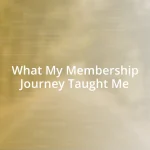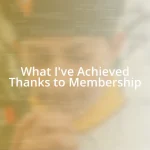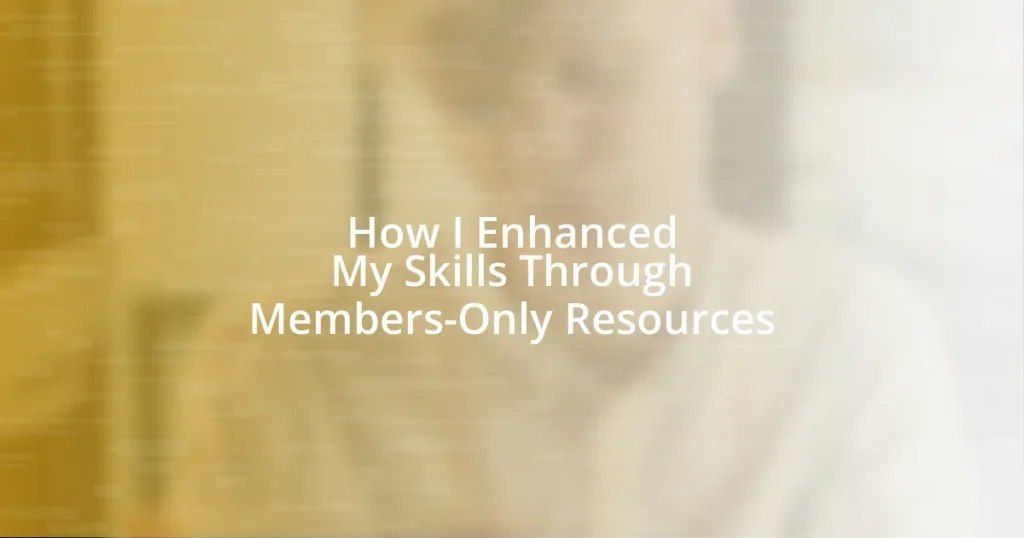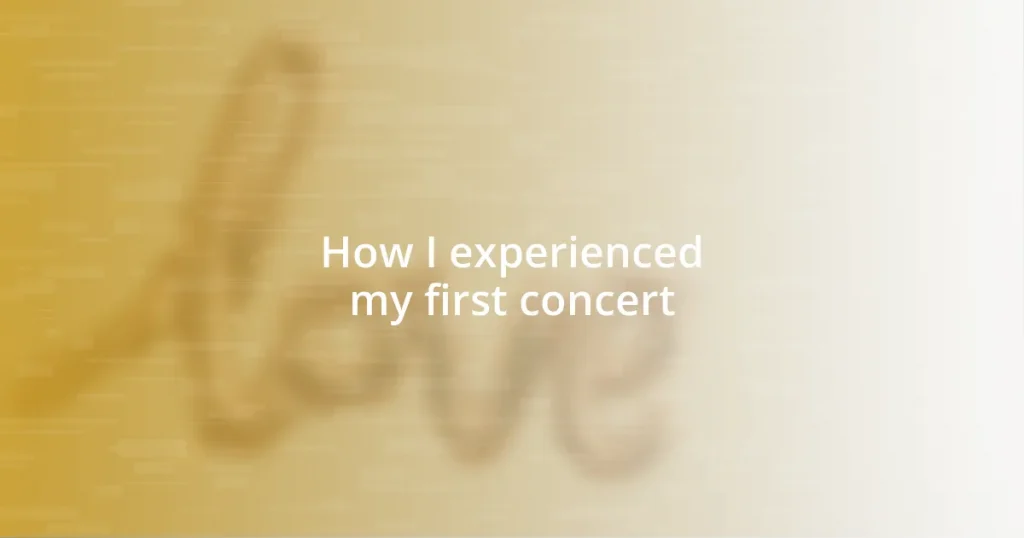Key takeaways:
- Members-only resources foster community engagement and provide unique learning opportunities that enhance skill development.
- Identifying key skill areas through self-assessment, peer feedback, and market research is crucial for personal and professional growth.
- Implementing learned skills in real projects and collaborating with peers can significantly bolster understanding and confidence.
- Maintaining continuous learning strategies, including setting specific goals and utilizing various formats, ensures ongoing personal development.
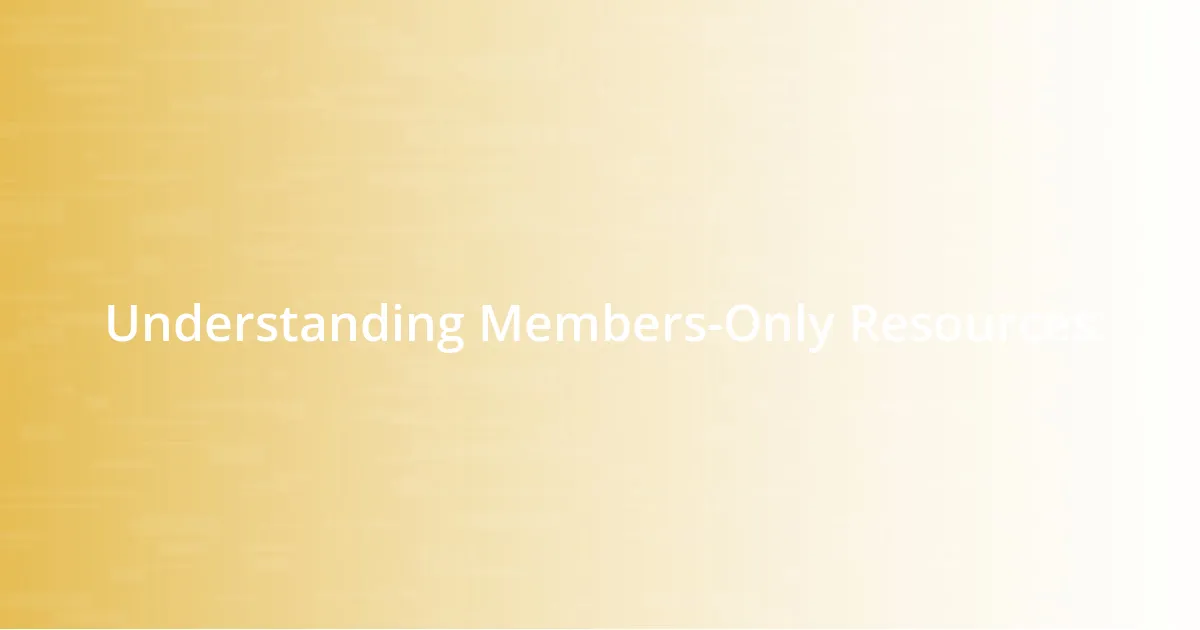
Understanding Members-Only Resources
Members-only resources can be a game-changer when it comes to skill enhancement, yet many remain unaware of the depth they offer. Often, these platforms are designed to cultivate a sense of community and exclusivity, which can feel motivating. I still remember the first time I accessed a members-only webinar; the excitement was palpable. It felt like I was stepping into a world where knowledge was shared freely among like-minded individuals.
These resources typically include a variety of advanced materials, from specialized training videos to interactive forums. What I found striking was the way these materials often addressed niche topics that aren’t available through conventional sources. For instance, I participated in a members-only workshop where we tackled real-life scenarios that added layers to my understanding—much more valuable than just theory.
It’s interesting to consider how being part of such exclusive groups can also enhance our emotional connection to learning. Have you ever felt that rush of adrenaline when sharing ideas with others who are just as passionate? I have, and it makes the experience infinitely richer. Engaging with peers in a supportive space not only solidifies knowledge but also encourages personal growth.
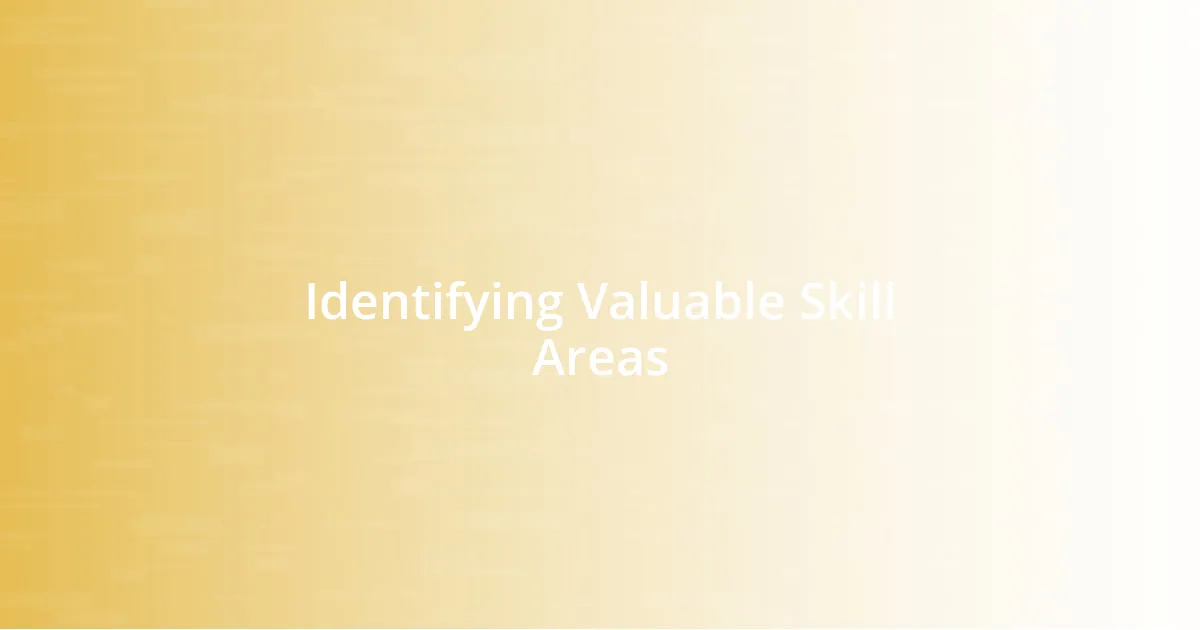
Identifying Valuable Skill Areas
Identifying the right skill areas to focus on can make all the difference in your growth journey. I realized my passions aligned with specific aspects of digital marketing when I started to dive deep into the materials offered by my members-only platform. It was through a series of evaluations, like self-reflection and member surveys, that I pinpointed which skills I needed to enhance, merging both personal interest and market demand.
To identify valuable skill areas, consider these approaches:
– Self-Assessment: Reflect on your current skills and how they align with your career goals.
– Feedback from Peers: Engaging with community members often reveals gaps you might not notice on your own.
– Market Research: Analyze trends in your industry to spot emerging skills that are in high demand.
– Trial and Error: Experiment with various resources and topics until something truly resonates with you.
– Mentorship: Seek advice from mentors who can provide insights on the skills necessary for success in your field.
Through one of my members-only resources, I participated in a skills assessment workshop, and it was eye-opening. As we mapped out our strengths and weaknesses, I found a passion for content creation that I hadn’t previously acknowledged. That moment of clarity ignited my desire to acquire new skills in that area, leading to further exploration and ultimately greater fulfillment in my work.
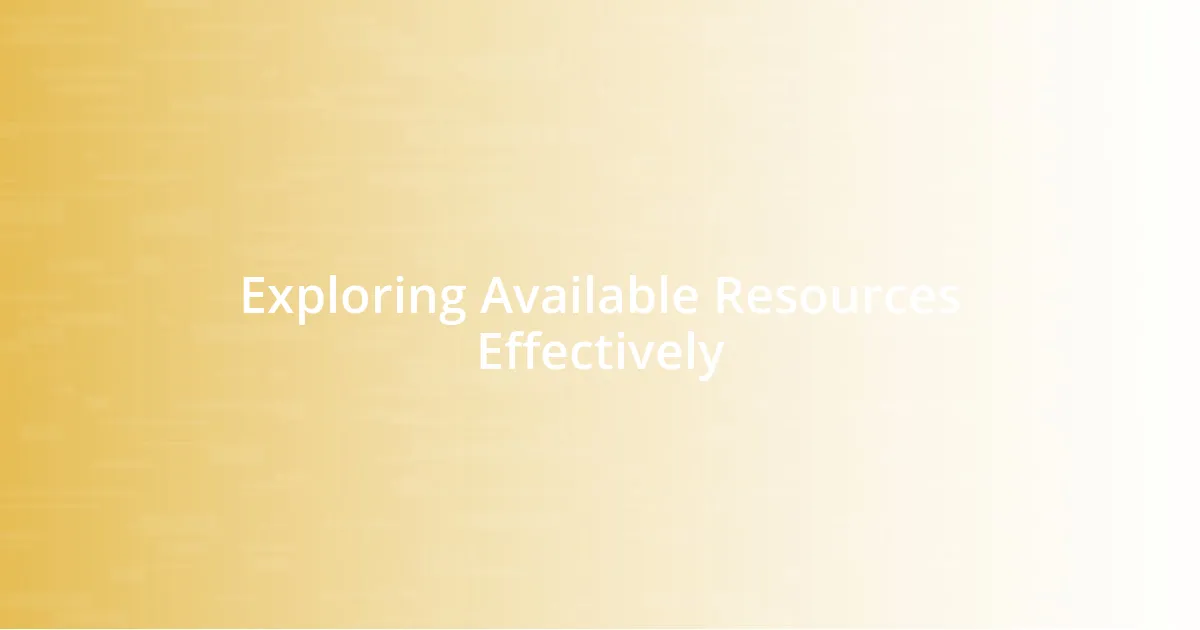
Exploring Available Resources Effectively
Exploring available resources effectively requires a strategic approach. When I first joined my members-only community, I wasn’t sure how to navigate the wealth of offerings. I vividly remember spending hours just browsing through archived webinars and articles, overwhelmed by the choices. The turning point came when I decided to create a structured plan. By prioritizing topics that aligned with my goals and scheduling time each week dedicated solely to these resources, I transformed what felt chaotic into a productive routine.
It’s essential to actively engage with the resources rather than just passively consuming them. I discovered that taking notes during webinars or forum discussions not only solidified my understanding but also created a personal reference guide for future use. Sharing my insights in community forums brought unexpected rewards; feedback from peers often illuminated perspectives I hadn’t considered. Have you ever found that discussing ideas with others can bring clarity to your thoughts? In my experience, those exchanges can lead to breakthroughs that solitary study rarely produces.
The comparison of various types of members-only resources can illuminate what might work best for you. Here’s a quick breakdown:
| Resource Type | Description |
|---|---|
| Webinars | Live or recorded sessions with industry experts that offer insights and real-time interaction. |
| Interactive Forums | Community-driven platforms for discussions, feedback, and idea sharing, fostering collaboration among members. |
| Workshops | Hands-on sessions focusing on practical applications of skills, often including real-world scenarios. |
| Resource Libraries | Curated collections of articles, videos, and tools, organized for easy navigation and exploration. |
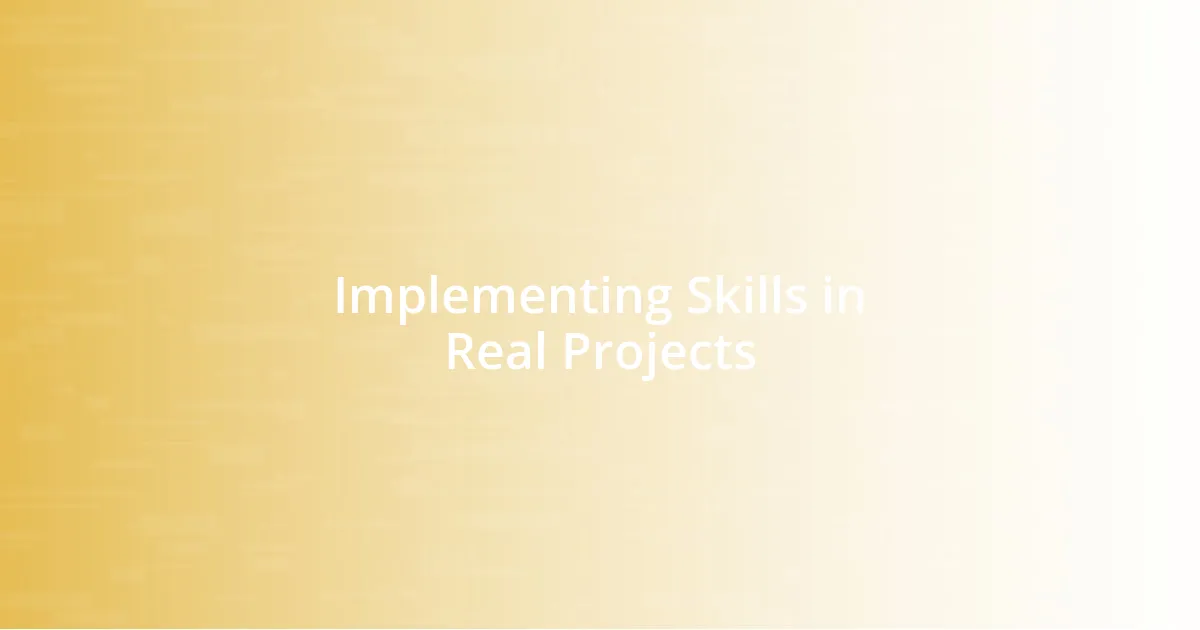
Implementing Skills in Real Projects
Implementing skills in real projects is where the true transformation happens. I remember taking on a project for a local nonprofit that needed help with their social media presence. It felt exhilarating to apply the content creation strategies I’d learned in the members-only workshops, and the outcome was rewarding—our campaign not only boosted their online visibility but also connected the community in ways I hadn’t anticipated. Have you ever felt that rush of accomplishment when your efforts directly impact others? There’s nothing quite like it.
I also found that collaborating with fellow members on joint projects greatly enhanced my learning experience. For instance, when we teamed up to develop a digital marketing strategy for a small business, we brought diverse skill sets to the table. The discussions were rich with ideas, and I often discovered new techniques just through collaboration. It reminded me that sometimes the best way to solidify what you’ve learned is to share the responsibility and creativity with others. Have you ever thought about how teamwork can elevate not just outcomes, but also personal growth?
Even small projects can be a launching pad for implementing skills. I decided to experiment with a personal blog, integrating SEO practices I had just learned. Initially, it felt daunting, but as I published my first few entries, I noticed an increase in traffic. The tangible results gave me a sense of confidence. Isn’t it interesting how trial and error can lead to mastery? Every step, even the missteps, were valuable lessons that deepened my understanding and shaped my journey.
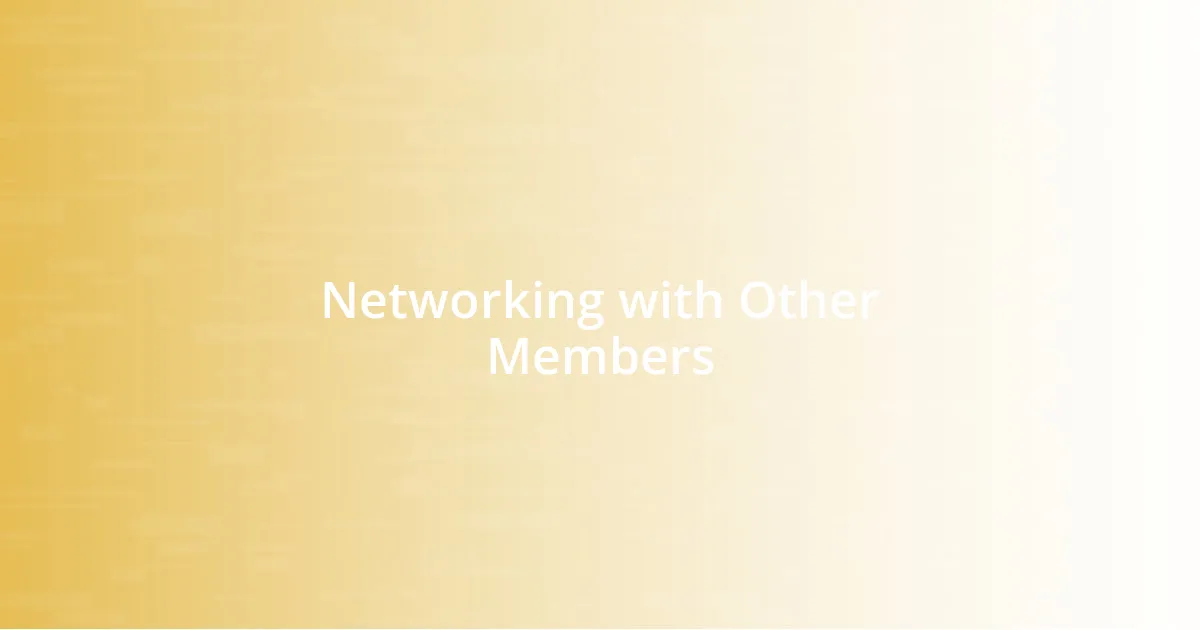
Networking with Other Members
Networking with other members has been one of the most rewarding aspects of my experience in a members-only community. I remember attending a virtual meetup where we discussed our personal projects. It felt refreshing to connect with people who shared similar goals and passions. Have you ever noticed how just one genuine conversation can spark so many new ideas? That evening, I left with a renewed sense of motivation and several tips that I couldn’t wait to try.
As I began to build relationships, I discovered the art of asking for feedback. I once reached out to a fellow member whose expertise in graphic design intrigued me. I shared my own work in progress, and his insights not only improved my project but also deepened our connection. The exchange felt like a blend of mentorship and friendship. Isn’t it fascinating how collaboration can transform both the work and the relationships we build?
Over time, networking blossomed into a community of support. I’ve teamed up with others on projects, and those collaborations were rich with creativity and shared ambition. I remember one particular instance when we organized a small webinar series together, pooling our different strengths. The excitement in the planning stages was palpable, and the outcome exceeded our expectations. The energy we created made it clear: the more we connect, the more opportunities we create for growth and learning. How has your networking experience shaped your approach to achieving your goals?
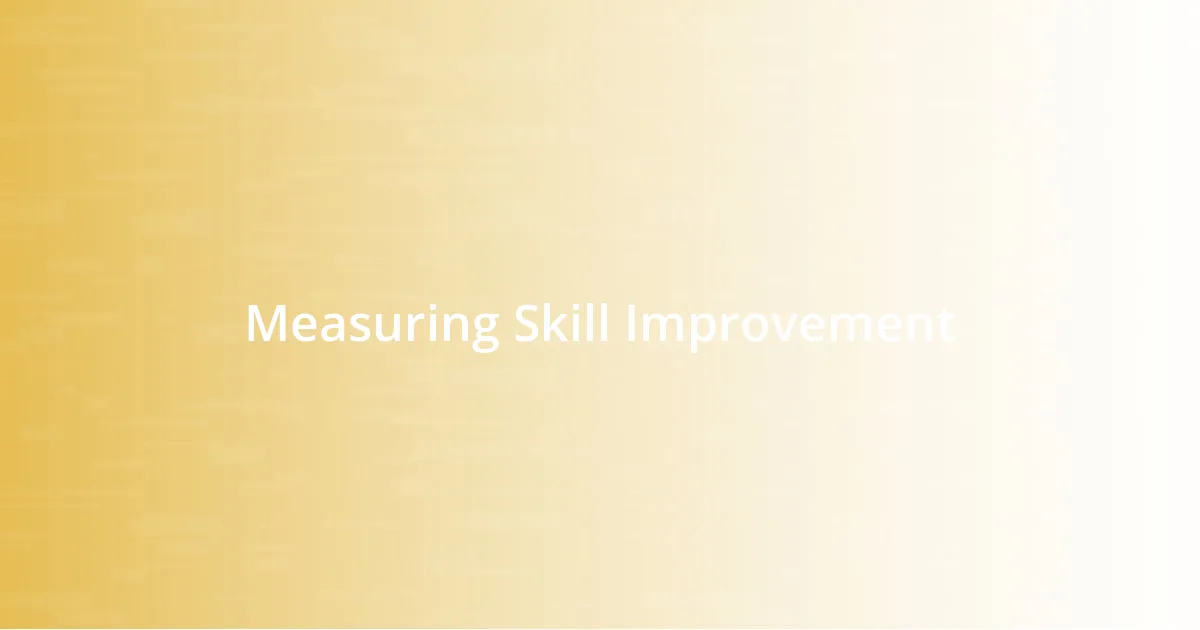
Measuring Skill Improvement
Measuring skill improvement can feel like navigating through a fog; at times, it’s challenging to see how far you’ve really come. For me, I turned to specific metrics to track progress. After applying what I learned in workshops, I started maintaining a personal journal, documenting milestones and the challenges I overcame. Reflecting on those entries not only revealed my growth but also reminded me of the moments that pushed my limits. Have you ever found clarity in your growth by simply looking back?
I also embraced self-assessment as a major component of my improvement journey. After completing each project, I would rate my performance on a scale from one to ten and jot down specific aspects that felt successful—or areas that needed more work. This honest evaluation helped me pinpoint skills that required further refinement. It’s astonishing how much insight can come from holding yourself accountable. Do you think you would benefit from a similar practice?
Moreover, seeking feedback from peers added another layer to my skill assessment. Engaging in constructive critiques after collaborative projects allowed me to understand my performance from different perspectives. One time, during a post-project debrief, a colleague pointed out a small yet crucial element of my approach that I overlooked. It was eye-opening! Have you considered how invaluable others’ viewpoints can be in measuring your own growth?
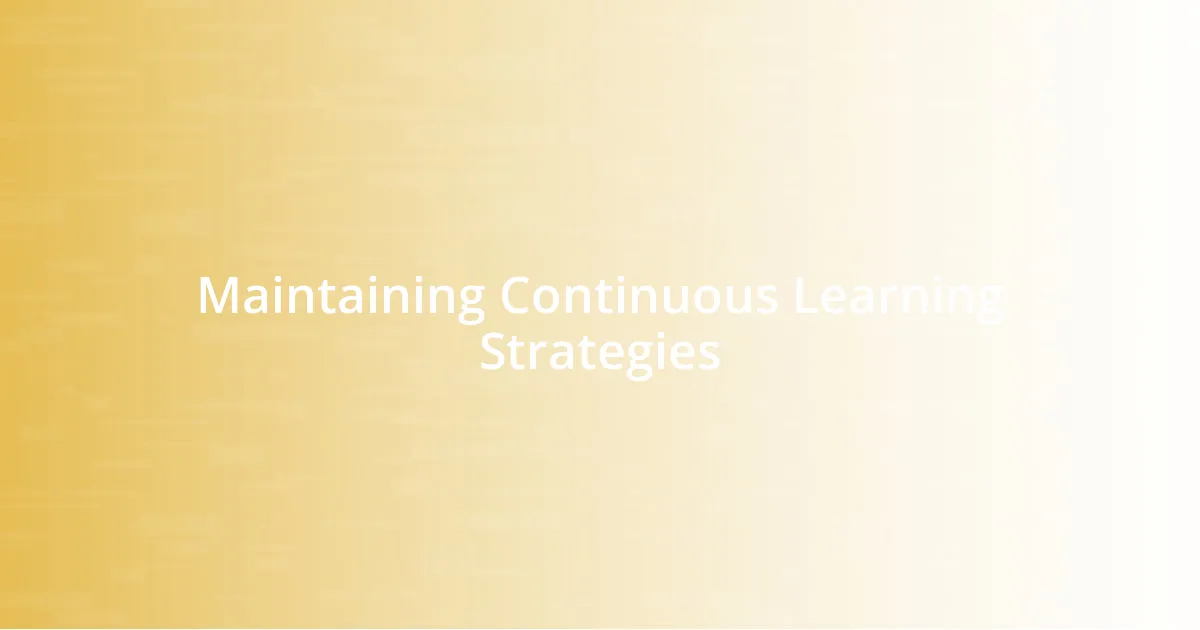
Maintaining Continuous Learning Strategies
Maintaining continuous learning strategies is something I’ve come to appreciate deeply. Early on, I set a goal to dedicate a few hours each week to explore new topics within my field. It amazed me how even just one article or tutorial could open doors to fresh ideas. Have you ever felt the thrill of understanding a concept that you struggled with before? I sure have, and it became a motivator for weekly explorations.
Another tactic I found effective was incorporating different formats for learning. I remember when I stumbled upon a podcast that changed my perspective entirely. Listening to industry experts share their stories while I was out for a run made the content so much more enjoyable and memorable. Isn’t it incredible how altering your learning medium can spark renewed interest? It’s like finding a new rhythm when you thought you’d mastered the beat.
I also learned the importance of setting specific learning outcomes. Early in my journey, I would dive into resources without a clear direction. Then, I started defining what I hoped to achieve each month. For instance, one month, I aimed to improve my public speaking skills. I scheduled practice sessions and sought feedback from fellow members afterward. The sense of accomplishment I felt after delivering a more confident presentation was exhilarating. Have you considered outlining your learning objectives to keep you on track? Trust me; it pays off!








